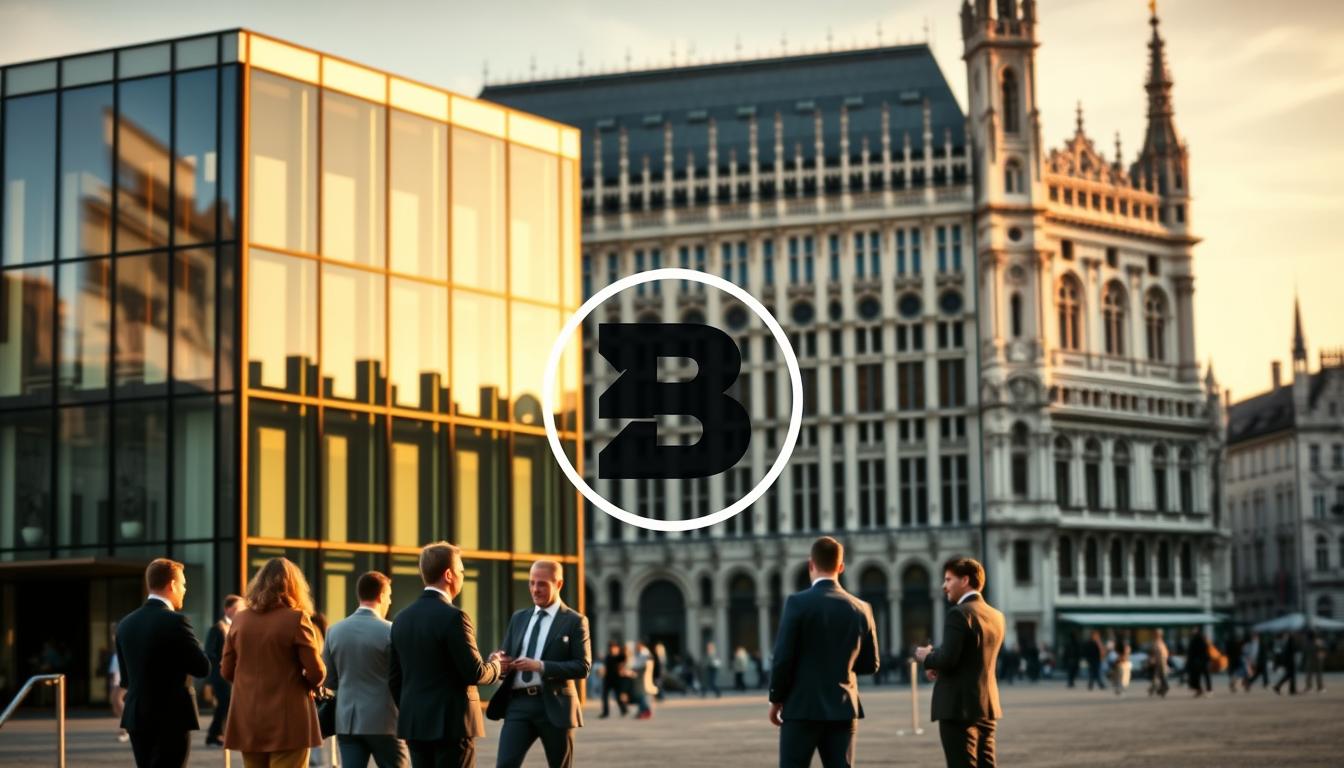Establishing a strong presence in Belgium offers exciting opportunities for businesses. With its thriving economy and supportive environment, the country is a hub for innovation and growth. Over 99% of companies here are SMEs, showcasing a vibrant entrepreneurial spirit.
Legal frameworks and registration processes are straightforward, making it accessible for both residents and expats. Institutions like ING Belgium and Business Belgium provide comprehensive support, ensuring you navigate the market with confidence.
This article will guide you through strategic steps, from digital marketing to enhancing customer experience. Whether you’re a startup or an established firm, Belgium’s dynamic market culture can help your company thrive.
Grasping the Belgian Market and Business Culture
Belgium’s diverse market presents a unique blend of tradition and innovation. Its economy is driven by a mix of traditional SMEs and foreign-owned businesses, each contributing significantly to its growth. Understanding this landscape is crucial for any company aiming to establish a strong presence.
Market Overview and Trends
The Belgian market is characterised by its stability and openness to international trade. Over 99% of businesses are SMEs, reflecting a robust entrepreneurial spirit. Recent trends show a growing emphasis on sustainability and digital transformation, with sectors like technology and logistics leading the way.
Foreign-owned firms also play a vital role, particularly in industries such as pharmaceuticals and automotive. This dual structure creates a dynamic environment where innovation thrives alongside established practices.
Insights into Local Business Culture
Belgian business culture is formal yet collaborative. Organisational structures tend to be flat, encouraging open communication and teamwork. Punctuality and professionalism are highly valued, making it essential to respect these norms when engaging with local partners.
Understanding consumer behaviour is equally important. Belgians appreciate quality and transparency, which should be reflected in your marketing strategies. Adapting your communication style to align with these cultural expectations can significantly enhance your brand’s appeal.
| Aspect | Details |
|---|---|
| Market Structure | Mix of SMEs and foreign-owned businesses |
| Key Trends | Sustainability, digital transformation |
| Cultural Norms | Formality, punctuality, transparency |
By leveraging these insights, you can craft a strategy that resonates with the Belgian market. Whether you’re a startup or an established firm, aligning with local practices will help you build trust and drive success.
Legal and Regulatory Considerations
Navigating the legal landscape in Belgium is essential for any business aiming to thrive. The country’s straightforward processes and supportive institutions make it an attractive destination for entrepreneurs. However, understanding the legal frameworks and compliance requirements is crucial to avoid pitfalls and ensure smooth operations.
Business Registration and Legal Structures
Starting a business in Belgium begins with choosing a company name and drafting articles of incorporation. Registration with the Crossroads Bank for Enterprises is mandatory, ensuring your company is legally recognised. The process is streamlined, making it accessible for both residents and expats.
Belgium offers various legal structures to suit different business needs:
- Sole Proprietorship: Ideal for small-scale operations.
- Partnership: Suitable for collaborative ventures.
- Limited Liability Company (LLC): Provides protection for personal assets.
- Cooperative: Focuses on collective ownership and decision-making.
Licences, Permits and Compliance
Securing the necessary licences and permits is a critical step. Non-EU nationals may require a professional card, which involves additional documentation. Key government agencies like the FPS and Business Belgium provide guidance to ensure compliance with local regulations.
Common compliance issues include tax obligations and adherence to labour laws. Staying informed and proactive can prevent legal challenges and enhance your business’s value in the market.
| Aspect | Details |
|---|---|
| Registration | Crossroads Bank for Enterprises |
| Legal Structures | Sole Proprietorship, Partnership, LLC, Cooperative |
| Key Agencies | FPS, Business Belgium |
By understanding these legal and regulatory considerations, you can establish a strong foundation for your business. Compliance not only ensures smooth operations but also builds trust with clients and partners, driving long-term success.
Defining Your Brand Identity and Unique Proposition
Creating a distinct identity is the cornerstone of any successful business. It’s not just about a logo or tagline; it’s about crafting a narrative that resonates with your audience. In Belgium, where consumers value authenticity and quality, your brand’s story must reflect heritage, values, and local cultural nuances.
Crafting a Compelling Brand Story
A strong brand story goes beyond facts and figures. It’s about connecting emotionally with your audience. For example, Belgian consumers appreciate brands that highlight craftsmanship and innovation. Whether you’re in the technology sector or the luxury goods industry, your story should showcase what makes you unique.
Consider incorporating local traditions or values into your narrative. This not only builds trust but also positions your brand as part of the community. “A brand’s story is its soul,” as one marketing expert aptly put it. Ensure your content aligns with these principles to create a lasting impression.
Developing a Unique Selling Proposition
Your unique selling proposition (USP) is what sets you apart from competitors. It’s the reason customers choose you over others. In Belgium, where quality assurance and certifications like GIA for diamonds are highly valued, your USP should emphasise these aspects.
- Quality Assurance: Highlight certifications to build consumer trust.
- Innovation: Showcase how your products or services push boundaries.
- Local Relevance: Tailor your USP to meet local market expectations.
For instance, a brand in the food industry might focus on sustainable sourcing, while a tech company could highlight cutting-edge solutions. Over time, a well-defined USP strengthens your position in the market.
Aligning your content with your brand values is equally crucial. Whether it’s through social media, your website, or marketing campaigns, consistency ensures your message resonates with your target audience. By defining your identity and proposition clearly, you lay the foundation for long-term success.
Strategic Research and Market Analysis
Strategic research is the backbone of any successful venture in Belgium. It involves a detailed approach to understanding the market, consumer behaviour, and competitor dynamics. This step ensures your offerings align with local preferences and industry trends.
Understanding Consumer Needs and Preferences
To succeed in Belgium, businesses must invest effort in gathering consumer insights. Surveys, focus groups, and social media analytics are effective methods. Belgians value quality and transparency, so your products or services should reflect these priorities.
For example, a local food brand might emphasise sustainable sourcing to appeal to eco-conscious consumers. Similarly, tech companies can highlight innovation to attract early adopters. Understanding these preferences helps tailor your offerings effectively.
Analysing Competitors and Market Trends
Benchmarking against competitors is another crucial step. Analyse their strengths, weaknesses, and market positioning. Tools like SWOT analysis and market reports provide valuable insights into industry trends.
Belgium’s market is dynamic, with sectors like technology and logistics leading the way. Staying updated on these trends ensures your business remains competitive. Regular research and adjustments are essential to meet evolving consumer needs.
- Stages of Market Research: Define objectives, collect data, analyse results, and implement findings.
- Consumer Insights: Use surveys, focus groups, and analytics to understand buyer behaviour.
- Competitor Benchmarking: Identify gaps and opportunities in the market.
- Continual Research: Adapt strategies based on ongoing market analysis.
By prioritising strategic research, businesses can navigate the Belgian market with confidence. This approach not only enhances your competitive edge but also builds trust with local consumers.
Building a Brand in Belgium: Key Strategies for Success
Developing a strong brand in Belgium requires a clear, step-by-step approach to ensure long-term success. From understanding local regulations to creating a professional online presence, each step plays a vital role in establishing your identity. Let’s explore the essential actions needed to thrive in this dynamic market.
Essential Steps for Brand Development
Start by defining your brand’s core values and mission. This foundation will guide all your decisions, from marketing strategies to customer interactions. “A well-defined brand is easier to communicate and resonates better with your audience,” says a marketing expert. Ensure your values align with Belgian consumer expectations, such as quality and transparency.
Next, conduct thorough market research. Understanding your target audience and competitors is crucial. Use tools like surveys and analytics to gather insights. This data will help you tailor your offerings to meet local needs effectively.
Integrating with Local Legal Frameworks
Compliance with local regulations is non-negotiable. Register your business with the Crossroads Bank for Enterprises and secure necessary permits. Non-EU nationals may require additional documentation, such as a professional card. Staying informed about tax and labour laws will prevent legal issues and build trust with stakeholders.
Collaborate with local agencies like Business Belgium for guidance. Their expertise can help you navigate the legal landscape smoothly, ensuring your business operates within the law.
Case Studies of Successful Brands
Examining successful brands in Belgium provides valuable lessons. For instance, a local food company gained popularity by emphasising sustainable sourcing. Another tech firm stood out by focusing on innovation and user-friendly solutions. These examples highlight the importance of aligning your brand with local values and trends.
Importance of a Professional Online Presence
Your website is often the first point of contact with potential customers. Ensure it is engaging, easy to navigate, and mobile-friendly. Highlight your unique selling points and include testimonials to build credibility. Regularly update your content to keep it relevant and engaging.
Social media platforms are equally important. Use them to share your brand story, connect with your audience, and showcase your products or services. Consistent communication fosters trust and loyalty.
By following these steps, you can build a robust brand that resonates with Belgian consumers. Stay methodical, adapt to local preferences, and leverage professional support to ensure success.
Content and Digital Marketing Approaches
Mastering digital marketing in Belgium requires a blend of local insights and strategic execution. With a diverse linguistic and cultural landscape, tailoring your approach to meet consumer expectations is essential. This section explores how to optimise your content and leverage social media to enhance your brand’s visibility.
Localised SEO and Content Optimisation
Localised SEO is crucial for reaching Belgian consumers effectively. Start by understanding search behaviour in both Dutch and French-speaking regions. Keyword research should reflect local terminology and cultural nuances. For instance, using terms like “winkel” (store) or “plaats” (place) can improve relevance.
Content optimisation goes beyond keywords. Ensure your website and blog posts are multilingual, catering to both language groups. Adapting your message to local values, such as sustainability or quality, can significantly boost engagement. “Content that resonates culturally builds trust,” notes a digital marketing expert.
- Multilingual Content: Translate and localise your content for Dutch and French audiences.
- Cultural Relevance: Highlight values like sustainability to connect with consumers.
- Technical SEO: Optimise site speed and mobile responsiveness for better user experience.
Effective Social Media and Influencer Collaborations
Social media is a powerful tool for engaging with Belgian consumers. Platforms like Instagram and Facebook are widely used, making them ideal for showcasing your brand. Tailor your posts to reflect local trends and preferences, such as highlighting eco-friendly products or community initiatives.
Collaborating with influencers can amplify your reach. Choose influencers who align with your brand values and have a strong following in Belgium. Their authentic endorsements can build trust and drive traffic to your online store.
- Platform Selection: Focus on platforms popular in Belgium, like Instagram and Facebook.
- Influencer Partnerships: Partner with influencers who resonate with your target audience.
- Engagement Strategies: Use interactive content like polls and stories to boost consumer interaction.
By integrating these strategies, you can create a robust digital marketing plan that resonates with Belgian consumers. With the right support and execution, your brand can thrive in this dynamic market.
Effective Online Strategies for E-Commerce Success
E-commerce success in Belgium hinges on tailored online strategies. With a diverse linguistic and cultural landscape, businesses must adapt to meet local needs. A seamless shopping experience, from website design to delivery, is crucial for customer satisfaction.
Designing a Multilingual, User-Friendly Website
Belgium’s dual-language regions require a multilingual approach. Your website should cater to both Dutch and French-speaking audiences. Use local terminology and ensure content is culturally relevant. For instance, highlighting quality and sustainability can resonate with Belgian consumers.
Navigation should be intuitive, with clear calls to action. Mobile responsiveness is essential, as many users shop on their phones. “A well-designed website builds trust and encourages repeat visits,” says a digital marketing expert.
Optimising Payment and Shipping Processes
Local payment methods like Bancontact are widely used in Belgium. Integrating these options into your payment gateway enhances convenience and reduces cart abandonment. Efficient shipping solutions, such as those offered by Bpost, ensure timely delivery and boost customer satisfaction.
Technology plays a vital role in streamlining operations. Automated tracking systems and real-time updates keep customers informed. By addressing these needs, businesses can create a seamless shopping experience.
- Multilingual Support: Ensure your website is accessible in Dutch and French.
- Local Payment Methods: Integrate Bancontact and other popular options.
- Efficient Shipping: Partner with reliable providers like Bpost for timely deliveries.
By focusing on these strategies, businesses can enhance their e-commerce performance in Belgium. A customer-centric approach, combined with localised solutions, ensures long-term success.
Crafting an Exceptional Customer Experience
Delivering an exceptional customer experience is a cornerstone of success in the Belgian market. With high competition, businesses must go the extra way to stand out. Personalised service and transparent communication are key to building trust and loyalty among Belgian consumers.
Personalised Service and Prompt Support
Belgian consumers value efficiency and reliability. Offering prompt support through tools like live chat can significantly enhance their experience. Multilingual support is equally important, catering to both Dutch and French-speaking customers.
Real-time communication ensures issues are resolved quickly, fostering satisfaction. “Customers remember how you make them feel,” says a customer service expert. By prioritising their needs, businesses can create lasting impressions.
Building Trust through Transparent Communication
Transparency is crucial in building trust. Clear policies on returns, pricing, and data privacy reassure customers. Social media platforms are an excellent way to communicate openly and engage with your audience.
Use these channels to share updates, respond to queries, and showcase your brand’s values. Consistent and honest communication fosters long-term loyalty, setting you apart in a competitive market.
- Live Chat: Provide instant support to address customer concerns.
- Multilingual Support: Cater to Belgium’s diverse linguistic landscape.
- Transparent Policies: Build trust with clear and fair guidelines.
- Social Media Engagement: Use platforms to connect and communicate effectively.
By focusing on these strategies, businesses can create a customer experience that resonates with Belgian consumers. Exceptional service not only drives satisfaction but also strengthens your position in the market.
Leveraging Partnerships and Local Support Networks
Forming strong partnerships is a vital step for businesses aiming to thrive in Belgium. Collaborating with local agencies and financial institutions can provide a competitive edge, offering practical guidance and resources. These alliances not only enhance market visibility but also ensure compliance with regional laws and regulations.
Collaborating with Local Agencies
Local agencies, such as the European Enterprise Network, offer valuable support for businesses. They provide insights into market trends, regulatory requirements, and funding options. Partnering with these organisations can streamline your operations and help you navigate the Belgian market with confidence.
For instance, agencies often assist with registration processes and offer tailored advice on local laws. This support ensures your business remains compliant while focusing on growth. “Collaboration with local agencies is a strategic move for long-term success,” notes a business consultant.
Utilising Business and Financial Support Services
Financial institutions in Belgium provide essential services, from loans to investment opportunities. Leveraging these resources can fuel your business’s expansion and innovation. Many institutions also offer grants and subsidies, making them a valuable option for startups and SMEs.
Selecting the right partners is crucial. Ensure they align with your brand’s values and objectives. This alignment fosters trust and strengthens your market position. “The right financial partner can transform your business trajectory,” says a financial advisor.
| Benefit | Details |
|---|---|
| Market Visibility | Partnerships enhance your presence in the local market. |
| Regulatory Guidance | Local agencies provide insights into compliance requirements. |
| Financial Support | Institutions offer loans, grants, and investment opportunities. |
By leveraging these partnerships, businesses can achieve sustainable growth in Belgium. Strategic alliances not only provide practical support but also build a foundation for long-term success.
Innovation and Adaptation in a Dynamic Market
Innovation is the driving force behind success in Belgium’s competitive market. Businesses must continuously evolve to meet changing consumer demands and industry trends. By embracing technological advances and adapting to new standards, companies can maintain a strong position in this dynamic environment.
Embracing Technological Advances
Technology plays a pivotal role in transforming industry practices. From automation to artificial intelligence, businesses can streamline operations and enhance customer engagement. For instance, integrating Dutch language tools into your media strategy can improve accessibility for local audiences.
Adopting modern communication tools, such as chatbots and social media platforms, ensures seamless service help. These innovations not only boost efficiency but also create a personalised experience for customers. “Technology is not just a tool; it’s a catalyst for growth,” says a digital transformation expert.
Staying Ahead of Industry Trends
Keeping pace with industry trends is essential for long-term success. Regularly analysing market data helps businesses identify emerging opportunities and potential challenges. For example, adhering to standard practices while incorporating new ideas ensures relevance in a competitive landscape.
Businesses should also focus on sustainable practices and ethical operations. These values resonate strongly with Belgian consumers, fostering trust and loyalty. By maintaining a balance between tradition and innovation, companies can thrive in this evolving market.
| Strategy | Benefit |
|---|---|
| Technological Integration | Enhances efficiency and customer engagement |
| Market Trend Analysis | Identifies opportunities and challenges |
| Sustainable Practices | Builds trust and loyalty among consumers |
By prioritising innovation and adaptation, businesses can navigate Belgium’s dynamic market with confidence. Embracing change and leveraging technology ensures sustained growth and success.
Final Reflections on Establishing Your Brand in Belgium
Successfully establishing your presence in Belgium hinges on a well-rounded approach. Integrating legal compliance, digital marketing, and exceptional customer service is key to creating a sustainable brand. Balancing cost management with innovative work practices ensures long-term growth.
Reflect on the importance of meeting the criterion for success, such as localised strategies and transparent communication. These elements not only build trust but also position your brand as a trusted home for Belgian consumers.
Take actionable steps today to align your efforts with the dynamic market. For further insights, explore detailed guides from authoritative sources and turn your vision into reality.
FAQ
What are the key trends in the Belgian market?
The Belgian market is known for its focus on quality, sustainability, and innovation. Consumers value locally sourced products, eco-friendly practices, and personalised experiences. Staying updated on these trends can help your company stand out.
How important is localisation in Belgium?
Localisation is crucial. Belgium’s multilingual culture, with Dutch, French, and German speakers, requires tailored content and marketing strategies. A localised approach ensures your message resonates with diverse audiences.
What legal steps are needed to register a business in Belgium?
Registering a business involves choosing a legal structure, obtaining necessary licences, and complying with local regulations. Consulting a legal expert can streamline this process and ensure compliance with Belgian law.
How can I create a unique brand identity in Belgium?
Craft a compelling brand story that reflects your values and resonates with Belgian consumers. Highlight your unique selling proposition to differentiate yourself from competitors in the market.
What role does social media play in brand building?
Social media is a powerful tool for engaging with consumers, sharing content, and building a loyal following. Collaborating with influencers can amplify your reach and enhance your brand’s visibility.
How can I ensure a seamless e-commerce experience?
Design a multilingual, user-friendly website and optimise payment and shipping processes. A smooth online experience encourages customer satisfaction and repeat business.
What strategies help build trust with Belgian customers?
Offer personalised service, prompt support, and transparent communication. These efforts foster trust and loyalty, which are essential for long-term success in the Belgian market.
Are there local support networks for businesses in Belgium?
Yes, collaborating with local agencies and utilising business support services can provide valuable resources and insights. These partnerships can help your company navigate the market effectively.
How can I stay ahead in a competitive industry?
Embrace technological advances and stay informed about industry trends. Innovation and adaptability are key to maintaining a competitive edge in Belgium’s dynamic market.







